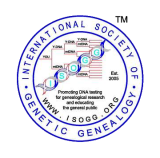Investigative Genetic Genealogy Accreditation Board
From ISOGG Wiki
The Investigative Genetic Genealogy Accreditation Board (IGGAB) is an independent and registered 501(c)3 non-profit organization which aims to uphold the integrity of Investigative Genetic Genealogy (IGG) by ensuring its competent and ethical use.
While IGG is a valuable new tool for investigating major violent crimes and identifying human remains, IGGAB cites an “urgent need for ethical standards and proof of proficiency” for those doing the work.[1] To address this need, IGGAB developed a set of professional standards titled Investigative Genetic Genealogy – Professional Standards and Accreditation Requirements. These standards were made available for input from the IGG community in April 2023, and IGGAB is currently considering the feedback.
Further, IGGAB will be implementing an application process to become an Accredited Investigative Genetic Genealogist (AIGG). Applicants must pass an exam that tests their knowledge of IGG core competencies. The three-part goal of the AIGG program is to “build public trust in [IGG], ensure that accredited practitioners are proficient and ethical, and provide accountability if a practitioner falls below standards.”[2] The exam is under development.
History
IGGAB was established in 2022.
Current board members include David Gurney (JD, PhD), Margaret Press (PhD), Carol Isbister Rolnick, Andrew Hochreiter (MEd, MIS), Bonnie Bossert (MBA, GC), Michele Kennedy (CLEA), and Amanda Reno.
IGGAB’s Advisory Board members include CeCe Moore, Blaine Bettinger (PhD, JD), Catherine B. W. Desmarais (CG), Leigh Clark (MS), Daniel Hellwig, Greg Hampikian (PhD), John Kellner (JD), Ken Carriere (BA), Ginny Gleason, Eric Hendershott, Janel Cherry Daniels, Cairenn Binder (MS, RN), Trish Hurtubise, and Kevin Lord.
Further reading
- Gurney D, Press M, Moore C et al. The need for standards and certification for investigative genetic genealogy, and a notice of action. Forensic Science International 2022; 341: 111495.
- Taylor M. Board releases draft IGG standards, accreditation requirements. Forensic Magazine, 3 May 2023.
- Larkin L. A Board of Certification for Investigative Genetic Genealogy is announced. The DNA Geek, 19 October 2022.
References
- ↑ Investigative Genetic Genealogy Accreditation Board, IGGAB (https://www.iggab.org/ 2023).
- ↑ Ibid.
